SYDNEY: David Warner has been handed the chance of a hoped-for Sydney Cricket Ground farewell after being named in Australia’s squad for the first of three home tests against Pakistan.
The squad named Sunday, which includes the 37-year-old opener, is only for the first test at Perth from Dec. 14-19.
If he holds his place for the second test at the Melbourne Cricket Ground starting on Boxing Day, Warner will be in line for his dream farewell on his home ground in Sydney from Jan. 3 to 7.
Warner’s recent test form has been mixed and he has averaged 28 in test matches since the summer of 2019 when he made a triple century against Pakistan at Adelaide. He has made clear his wish to end his Baggy Green career at Sydney while continuing to play for Australia in white ball cricket.
Warner will start the summer opening the batting with Usman Khawaja while opener candidates Cameron Bancroft, Matt Renshaw and Marcus Harris will have a chance to stake their claims with the Prime Minister’s XI which plays Pakistan at Canberra from Dec. 6 to 9.
Fast bowler Lance Morris is closer to a test debut after being recalled to the 14-man squad. Cameron Green also returns after previously losing his test spot to Mitch Marsh and Alex Carey has been named wicketkeeper after losing that role at the recent one-day World Cup.
Spinner Nathan Lyon is back after recovering from a calf injury which ruled him out of the latter stages of the Ashes series. He replaces Todd Murphy.
Chairman of selectors George Bailey said the incumbents had earned the opportunity to play the first test of the summer after an outstanding winter in which Australia won the World Test Championship and retained the Ashes.
“Thirteen members of the squad were part of the victorious World Test Championship and successful Ashes tours over the winter and Lance Morris has been recalled after recovering from his back injury over the same period,” Bailey said.
“As ever, there will be opportunities in the short to medium term to break into this squad and we look forward to seeing the continued strong performances from players who have been performing domestically, many of whom will get a tremendous opportunity in the PM’s XI fixture against Pakistan later this week.”
Morris has taken 11 wickets at 25.5 in three Sheffield Shield matches for West Australia since returning from the back injury which ruled him out of the Ashes.
Warner’s decision to publicly announce his hope for a Sydney finish was met with strong criticism from his former Australia teammate, fast bowler Mitchell Johnson.
In a column Sunday in the West Australian newspaper, Johnson took issue with Warner.
“As we prepare for David Warner’s farewell series, can somebody please tell me why?” Johnson wrote. “Why a struggling test opener gets to nominate his own retirement date.
“And why a player at the center of one of the biggest scandals in Australian cricket history warrants a hero’s send-off?”
Johnson made reference to the Sandpapergate ball-tampering scandal involving the Australia team in South Africa in 2018. Warner received a 12-month ban for his role in the scandal.
“Although Warner wasn’t alone in Sandpapergate, he was at the time a senior member of the team and someone who liked to use his perceived power as a “leader,” Johnson wrote. “Now the way he is going out is underpinned by more of the same arrogance and disrespect to our country.”
Despite criticism, David Warner named in Australia squad for first Pakistan test
https://arab.news/rn2tw
Despite criticism, David Warner named in Australia squad for first Pakistan test
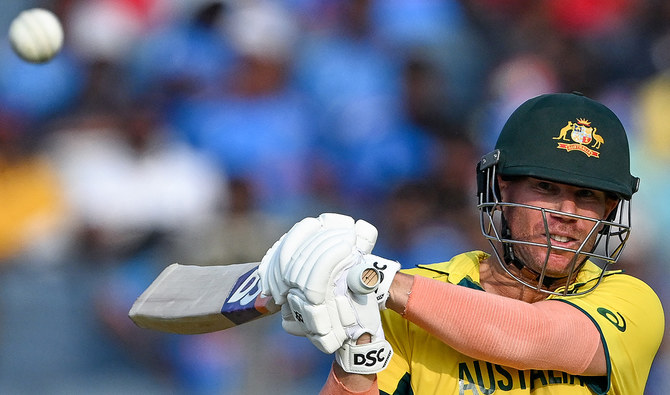
- Warner wants to end his career at Sydney, his home ground, while continuing to play white ball cricket
- Pakistan are scheduled to play against the Prime Minister’s XI at Canberra between December 6 and 9
Pakistani forces kill 6 militants in volatile northwest near Afghanistan— army

- Pakistani security forces carry out twin raids in Dera Ismail Khan, North Waziristan districts
- Such operations are often conducted against Pakistani Taliban or Tehreek-e-Taliban Pakistan group
PESHAWAR, Pakistan: Pakistani security forces killed six militants in twin raids Wednesday targeting their hideouts in the country’s volatile northwest region bordering Afghanistan, the military said.
Five militants were killed in the first raid in Dera Ismail Khan district in Khyber Pakhtunkhwa province, the military said in a statement. It did not provide further details about the slain insurgents, and only said the men were behind various previous attacks on the security forces.
Another militant was killed in the second raid in a former stronghold of the Pakistani Taliban in the North Waziristan district in the northwest.
The statement did not provide any further details about the identity of the slain men.
Such operations often target the Pakistani Taliban, which has been emboldened by the Taliban takeover of Afghanistan in 2021. Known as the Tehreek-e-Taliban Pakistan or TTP, it is a separate group but a close ally of the Afghan Taliban.
Pakistan hikes electricity prices by Rs2.83 per unit citing fuel cost adjustment
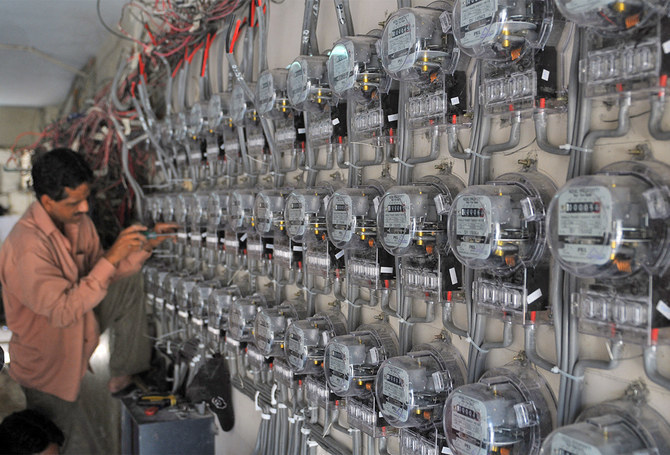
- Fuel cost adjustment for March to reflect in consumers’ bills for the month of May, says power regulator
- Pakistan has been caught in a high inflationary cycle since April 2022 due to surging food and fuel prices
ISLAMABAD: Pakistan’s National Electric Power Regulatory Authority (NEPRA) on Wednesday authorized distribution companies to levy a Rs2.83 per unit additional charge on consumers’ bills for May, with the move likely to fuel inflation in a country already suffering an economic crisis.
A notification by NEPRA seen by Arab News stated that the fuel cost adjustment pertains to March, adding that the additional charges would apply to all consumer categories except “Electric Vehicle Charging Stations (EVCS) and lifeline consumers.”
“The said adjustment shall be shown separately in consumers’ bills on the basis of units billed to the consumer in the month of March 2024,” the notification said.
Pakistan has been caught in a high inflationary spiral since April 2022, with the highest-ever inflation rate recorded at 38 percent in May 2023. The government credits soaring inflation to painful decisions it had to take to meet conditions for an International Monetary Fund (IMF) bailout program, including hiking energy tariffs and fuel prices.
Gas and electricity rates were hiked by 318.7 percent and 73 percent respectively in a year, according to official data.
The price hikes come as Pakistan is set to begin discussions with the IMF this month over a new multi-billion-dollar loan agreement after completing its nine-month, $3 billion loan arrangement with the lender.
Under the last IMF bailout, Pakistan was told to prevent further accumulation of circular debt in its power sector, arising from subsidies and unpaid bills. For a new program, the South Asian nation will need to implement reforms to reduce costs by improving electricity transmission and distribution, moving captive power into the grid, improving governance, and combating theft.
It will also have to maintain power and gas tariffs at levels that ensure cost recovery, with adjustments made to safeguard the financially vulnerable, through existing progressive tariff structures.
Senior World Bank official concludes Pakistan trip after discussing reforms with officials
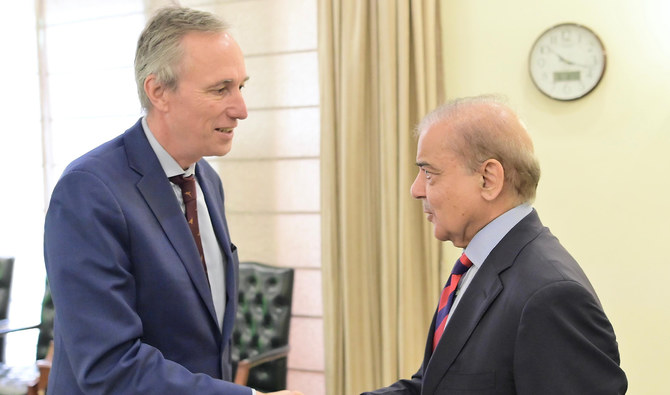
- World Bank Vice President for South Asia Martin Raiser meets PM Sharif, key officials in Islamabad
- Raiser praises Pakistan’s reform plans to boost growth, attract private investment and tackle poverty
ISLAMABAD: A senior World Bank official concluded his three-day visit to Pakistan on Wednesday, holding discussions with Prime Minister Shehbaz Sharif and key government ministers on Islamabad’s fiscal and economic reforms, a statement from the international institution said.
World Bank Vice President for South Asia Martin Raiser arrived in the federal capital on May 6, with his visit taking place as Pakistan faces a chronic balance of payment crisis, forcing it to turn to the International Monetary Fund (IMF) for a new long-term bailout deal.
Pakistan has faced the challenges of revenue generation and government expenditure in the past and struggled with high levels of debt, a large fiscal deficit and an ongoing need for structural reforms to improve its fiscal sustainability.
“The World Bank Vice President for South Asia, Martin Raiser, concluded his three-day visit to Pakistan today and reaffirmed the World Bank’s support to stabilize the economy and accelerate inclusive and resilient growth,” a press release by the international institution read.
It said Raiser met Sharif, ministers of finance, water, power, energy, and petroleum, and his counterparts to discuss Pakistan’s development priorities.
“The discussions focused on economic and fiscal reforms, human capital development, adaptation to climate change, energy sector reforms, and digitalization as a foundational enabler and accelerator of development,” the World Bank added. \
Raiser said he was pleased to learn of Pakistan’s reform plans to boost growth and attract private investment, strengthen climate resilience, and invest in human capital to tackle daunting challenges such as child stunting and poverty.
The World Bank official also visited Pakistan’s northwestern Khyber Pakhtunkhwa (KP) province to meet Chief Minister Ali Amin Gandapur.
“Discussions focused on the provincial developmental priorities and how can the World Bank step up its support in key sectors, like education, water and sanitation, health, rural roads, and livelihoods,” the statement said.
He also attended a national conference on education in Islamabad, where PM Sharif also spoke. Raiser reaffirmed the World Bank’s commitment to urgent action to tackle the large number of out-of-school children in Pakistan.
PM Sharif declares ‘education emergency’ across Pakistan to enroll out-of-school children
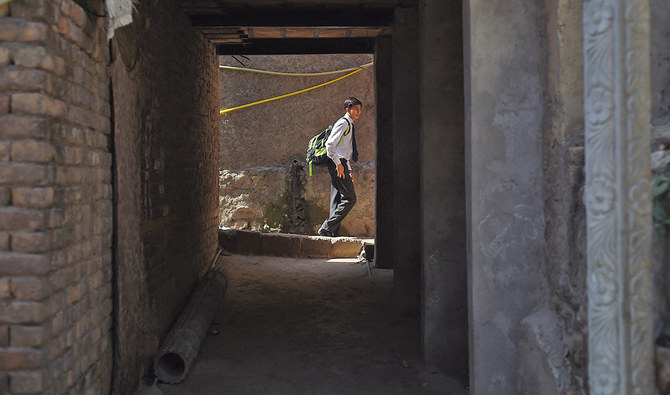
- Pakistan has one of the world’s highest out-of-school children population at 26.2 million
- PM Shehbaz Sharif says will personally oversee the national program to ensure its success
ISLAMABAD: Prime Minister Shehbaz Sharif on Wednesday declared an “education emergency” across Pakistan on Wednesday, vowing to personally oversee the program which he hoped would enroll over 26.2 million out-of-school children in educational institutions.
Pakistan has the second-highest population of out-of-school children in the world at 26.2 million, according to Unicef Pakistan. Pakistani experts have identified population growth, lack of localized strategies, and economic issues as the main reasons why over 26 million Pakistani children are not enrolled in schools across the country.
A report by Pakistan’s education ministry in January revealed that out of 26.2 million out-of-school children, 11.73 million are in Punjab, 7.63 million in Sindh, 3.63 million in Khyber Pakhtunkhwa (KP) and 3.13 million in Balochistan province.
Speaking at an event titled “National Conference on Education Emergency,” Sharif said enrolling millions of children back into schools was a “tall order” that could be achieved with conviction.
“I declare from this moment an emergency in education all over Pakistan,” Sharif told members of the conference, which included federal ministers, parliamentarians, vice-chancellors, and diplomats.
The Pakistani prime minister said he would personally oversee the national program, adding that he would meet the chief ministers of all four provinces in the country for the sake of Pakistani children and their future.
“This is about our children and our future,” Sharif said. “This is a very challenging task, no doubt. But nations which had faced difficulties and defeat in the past arose from the ashes of defeat.”
He hoped provincial governments in Pakistan would help the center in achieving its goal of promoting education in the country and transforming it into an educated nation.
“I guarantee, if we move in unison to find our space, Pakistan will become one of the most educated societies one day soon,” he remarked.
Pakistan’s first lunar satellite ICUBE-Q successfully enters moon’s orbit
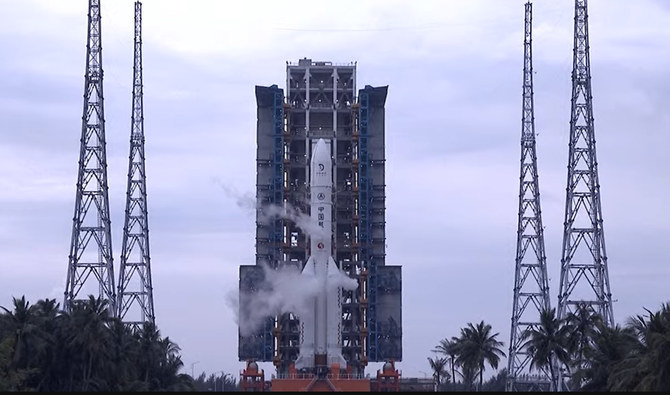
- ICUBE-Q was deployed in moon’s orbit around 1:14 p.m. Pakistan Standard Time, says Institute of Space technology official
- IST official describes development as “important” one for Pakistan allowing it to conduct “bigger” space missions in future
Islamabad: Pakistan’s first lunar satellite ICUBE-Q entered the moon’s orbit successfully today, Wednesday, a senior official of the country’s Institute of Space Technology (IST) confirmed, saying the “important” development could pave the way for “bigger” space missions for the country in the future.
The ICUBE-Qamar satellite carries two optical cameras to image the lunar surface and weighs around 7kg. Cubesats are tiny box-shaped satellites that are mainly launched into low Earth orbit to observe the Earth, test new communications technology, or perform miniature experiments.
Pakistan’s first lunar satellite was launched aboard China’s Chang’e-6 probe on May 3. The Chinese probe is tasked with landing on the far side of the moon, which perpetually faces away from the Earth, after which it will retrieve and return samples. China is the first country to make such an ambitious attempt.
“Our ICUBE-Q was deployed successfully in its orbit at 1:14 p.m. Pakistan Standard Time,” Dr. Khurram Khurshid, the head of the electrical engineering and computer science department at IST and a co-lead on the satellite project, told Arab News.
Dr. Khurshid said Pakistani officials will continue to test the satellite’s system for the next three to four days. He said initial tests revealed there were no complications with the cubesat’s system.
The IST official said the development means Pakistan is officially in an exclusive club of countries that have conducted deep space missions.
“This is the first step, a step in the right direction,” Dr. Khurshid noted. “It can lead to bigger space missions, such as landing on the moon or various other experiments.”
Dr. Khurshid said Pakistan would be able to share images from the satellite by May 15.
Around 100 students from IST contributed to developing the satellite. Pakistan’s proposal to build the satellite was accepted by the China National Space Agency (CNSA) from plans submitted by eight member states of the Asia-Pacific Space Cooperation Organization (APSCO).
The design, development, and qualification of the ICUBE-Q satellite were spearheaded by faculty members and students of the IST in collaboration with China’s Shanghai Jiao Tong University (SJTU), with support from Pakistan’s National Space Agency, SUPARCO.
The ICUBE-Q has two cameras as payload for taking images of the lunar surface that will be transmitted back to Earth for analysis.










